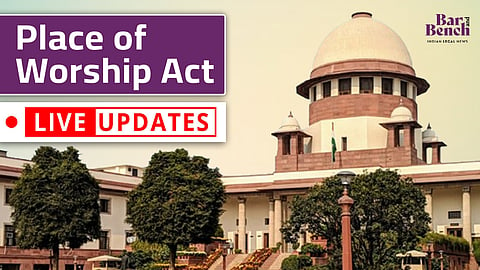- Latest Legal News
- News
- Dealstreet
- Viewpoint
- Columns
- Interviews
- Law School
- Legal Jobs
- हिंदी
- ಕನ್ನಡ

The Supreme Court is hearing a batch of petitions challenging provisions of the Places of Worship (Special Provisions) Act of 1991.
A Bench of Chief Justice of India (CJI) Sanjiv Khanna and Justices PV Sanjay Kumar and KV Viswanathan is hearing the matter.
Among those who have petitioned the Court in the matter is Bharatiya Janata Party (BJP) leader Ashwini Upadhyay, on whose plea the Court had issued notice in 2021. His plea states that the Act allows illegal acts of invaders who took over religious places to continue for perpetuity by barring legal remedies to aggrieved Hindus, Jains, Buddhists, and Sikhs.
In June 2022, the Jamiat Ulama-I-Hind moved the apex court seeking impleadment in the petition, contending that it was apparent that Upadhyay has sought to indirectly target places of worship which are presently of Islamic character.
Petitions challenging the Places of Worship Act were filed by others as well, including the Vishwa Bhadra Pujari Purohit Mahasangh. Several impleadment petitions have also been filed since in the matter.
The law in focus seeks to protect the status of all religious structures as it stood on the date of independence (August 1947) by barring courts from entertaining cases which raise dispute over the character of such places of worship.
The outcome of the case may have a bearing on ongoing suits filed by Hindu plaintiffs who have sought rights to properties housing Muslim mosques on claims that these mosques were built over ancient temples.
These suits include those concerning the Shahi Jama Masjid in Sambhal, the Gyanvapi Mosque in Varanasi, the Shahi Eidgah Masjid in Mathura and the Ajmer Dargah in Rajasthan. The Muslim parties have opposed the maintainability of such suits by citing the Places of Worship Act.
The law was introduced during the height of the Ram Janmabhoomi movement and it provides that such cases over competing religious rights that were already pending in courts would stand abated.
The Act, however, carved an exception for Ram Janmabhoomi site which was the basis for the Supreme Court's 2019 judgment in the Ayodhya case, where the disputed site at Ayodhya was handed over to the child deity Ram Lalla.
At the time, however, the Supreme Court reaffirmed that similar such cases cannot be entertained with respect to other sites in view of the Place of Worship Act.
Track this page for live updates from the hearing today.